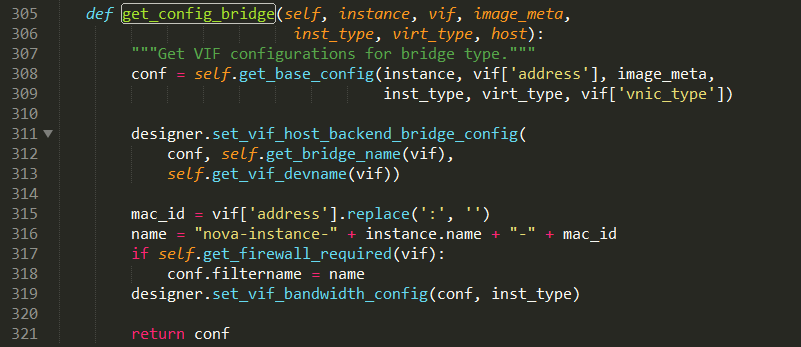前言:
当neutron-server创建了port信息,将port信息写入数据库中。流程返回到nova服务端,接着nova创建的流程继续走。在计算节点中neutron-agent同样要完成很多的工作来支持主机的通信。
简要流程:
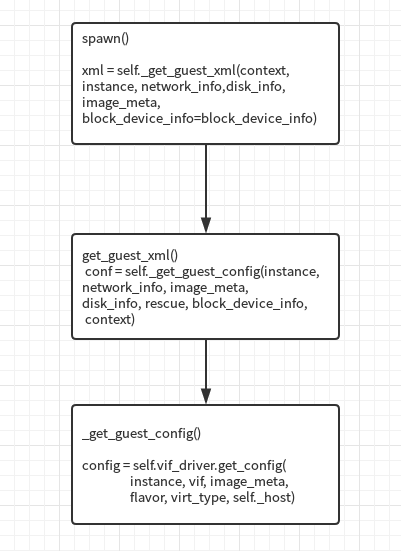
详细代码分析:
spawn()作用:
- 准备磁盘信息
- 获取镜像的获取路径
- 准备启动xml文件
- 创建主机和网络,调用create_domain_and_network()函数获取网络信息。
准备启动xml文件的过程稍后有详细分析。
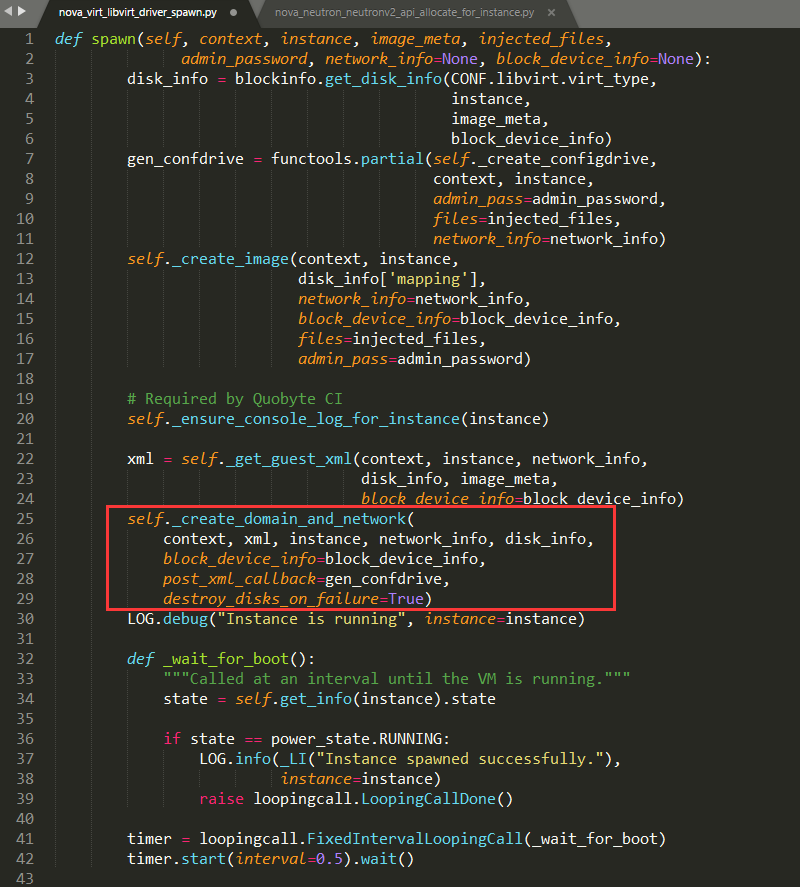
create_domin_and_network()
作用:
创建虚拟机过程中neutron工作主要体现的地方,详细的说明在下面的截图中。主要的工作是创建调用底层驱动libvirt创建虚拟机。
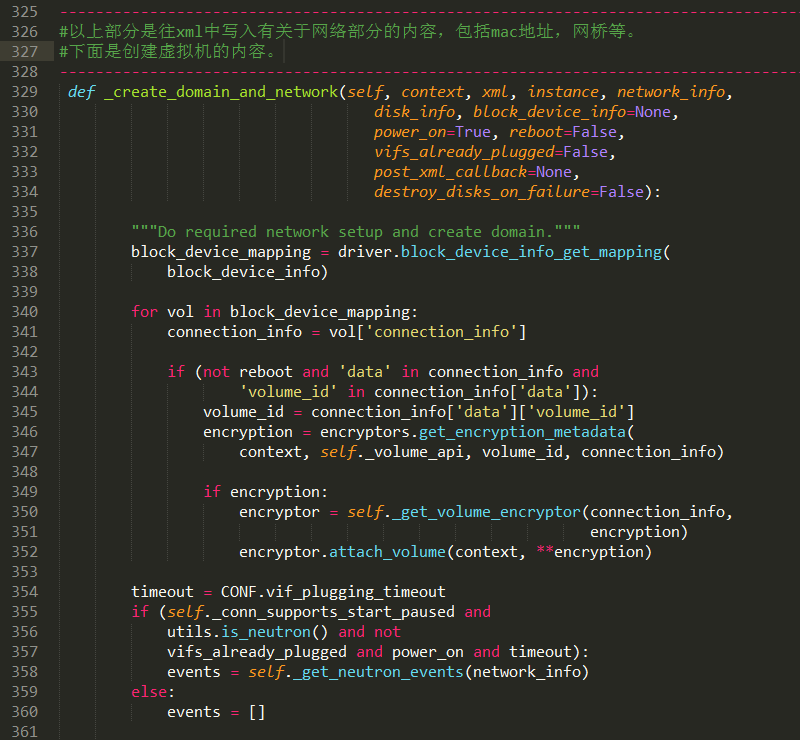
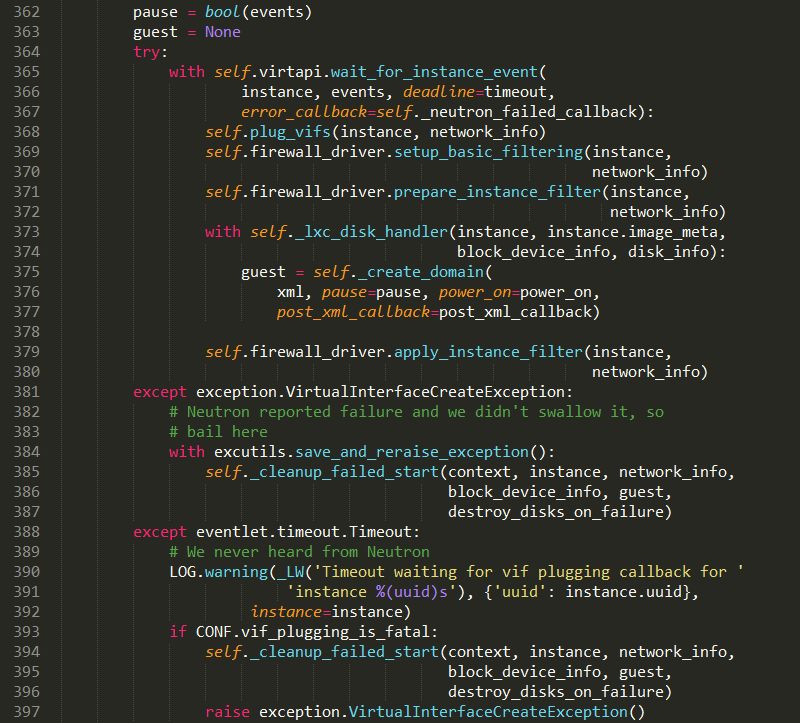
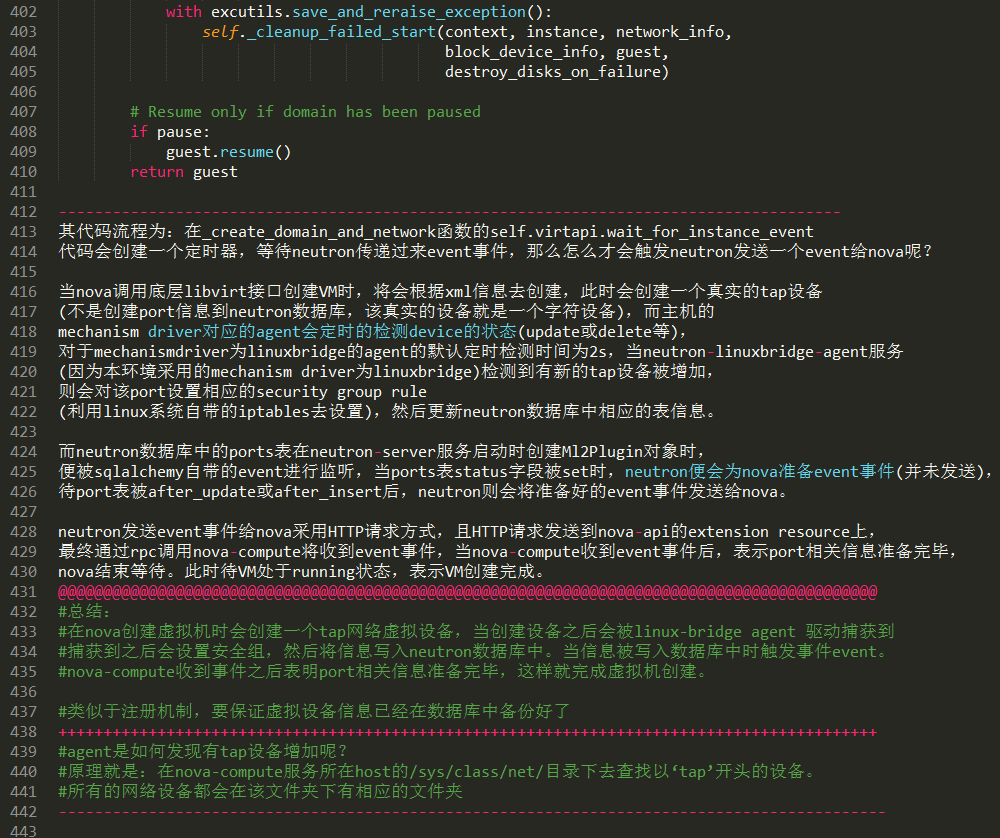
-------------------------------------------------------------------------------------------------nova创建xml文件-------------------------------------------------------------------------
xml文件如下所示,其中定义了主机必要信息如mac地址,内核,磁盘,分区信息,网卡等。
1 <domain type='qemu' id='3'> 2 <name>instance-00000002</name> 3 <uuid>8d812f63-573c-4f2c-a991-dfa68b844d20</uuid> 4 <metadata> 5 <nova:instance xmlns:nova="http://openstack.org/xmlns/libvirt/nova/1.0"> 6 <nova:package version="13.1.0-1.el7"/> 7 <nova:name>myInstanceWithVolume</nova:name> 8 <nova:creationTime>2016-08-19 03:17:58</nova:creationTime> 9 <nova:flavor name="m1.small"> 10 <nova:memory>2048</nova:memory> 11 <nova:disk>20</nova:disk> 12 <nova:swap>0</nova:swap> 13 <nova:ephemeral>0</nova:ephemeral> 14 <nova:vcpus>1</nova:vcpus> 15 </nova:flavor> 16 <nova:owner> 17 <nova:user uuid="6383b14b190d422ab3079e4e63c62e16">demo</nova:user> 18 <nova:project uuid="478a18506673406db8abc360cdc2f202">demo</nova:project> 19 </nova:owner> 20 <nova:root type="image" uuid="9bf97139-7760-4ace-b3d1-5bcd0ff30f55"/> 21 </nova:instance> 22 </metadata> 23 <memory unit='KiB'>2097152</memory> 24 <currentMemory unit='KiB'>2097152</currentMemory> 25 <vcpu placement='static'>1</vcpu> 26 <cputune> 27 <shares>1024</shares> 28 </cputune> 29 <resource> 30 <partition>/machine</partition> 31 </resource> 32 <sysinfo type='smbios'> 33 <system> 34 <entry name='manufacturer'>Fedora Project</entry> 35 <entry name='product'>OpenStack Nova</entry> 36 <entry name='version'>13.1.0-1.el7</entry> 37 <entry name='serial'>acb2b380-0bb5-7101-f93d-107563ca227e</entry> 38 <entry name='uuid'>8d812f63-573c-4f2c-a991-dfa68b844d20</entry> 39 <entry name='family'>Virtual Machine</entry> 40 </system> 41 </sysinfo> 42 <os> 43 <type arch='x86_64' machine='pc-i440fx-rhel7.0.0'>hvm</type> 44 <boot dev='hd'/> 45 <smbios mode='sysinfo'/> 46 </os> 47 <features> 48 <acpi/> 49 <apic/> 50 </features> 51 <cpu mode='host-model'> 52 <model fallback='allow'/> 53 <topology sockets='1' cores='1' threads='1'/> 54 </cpu> 55 <clock offset='utc'/> 56 <on_poweroff>destroy</on_poweroff> 57 <on_reboot>restart</on_reboot> 58 <on_crash>destroy</on_crash> 59 <devices> 60 <emulator>/usr/libexec/qemu-kvm</emulator> 61 <disk type='file' device='disk'> 62 <driver name='qemu' type='qcow2' cache='none'/> 63 <source file='/var/lib/nova/instances/8d812f63-573c-4f2c-a991-dfa68b844d20/disk'/> 64 <backingStore type='file' index='1'> 65 <format type='raw'/> 66 <source file='/var/lib/nova/instances/_base/86f82a7c75893f6ce52678cc7f7991aecc4aa9aa'/> 67 <backingStore/> 68 </backingStore> 69 <target dev='vda' bus='virtio'/> 70 <alias name='virtio-disk0'/> 71 <address type='pci' domain='0x0000' bus='0x00' slot='0x03' function='0x0'/> 72 </disk> 73 <disk type='block' device='disk'> 74 <driver name='qemu' type='raw' cache='none' io='native'/> 75 <source dev='/dev/disk/by-path/ip-192.168.8.8:3260-iscsi-iqn.2010-10.org.openstack:volume-13db53ea-475b-471d-bbb1-a0daffbf25ef-lun-0'/> 76 <backingStore/> 77 <target dev='vdb' bus='virtio'/> 78 <serial>13db53ea-475b-471d-bbb1-a0daffbf25ef</serial> 79 <alias name='virtio-disk1'/> 80 <address type='pci' domain='0x0000' bus='0x00' slot='0x04' function='0x0'/> 81 </disk> 82 <controller type='usb' index='0'> 83 <alias name='usb'/> 84 <address type='pci' domain='0x0000' bus='0x00' slot='0x01' function='0x2'/> 85 </controller> 86 <controller type='pci' index='0' model='pci-root'> 87 <alias name='pci.0'/> 88 </controller> 89 <serial type='file'> 90 <source path='/var/lib/nova/instances/8d812f63-573c-4f2c-a991-dfa68b844d20/console.log'/> 91 <target port='0'/> 92 <alias name='serial0'/> 93 </serial> 94 <serial type='pty'> 95 <source path='/dev/pts/3'/> 96 <target port='1'/> 97 <alias name='serial1'/> 98 </serial> 99 <console type='file'> 100 <source path='/var/lib/nova/instances/8d812f63-573c-4f2c-a991-dfa68b844d20/console.log'/> 101 <target type='serial' port='0'/> 102 <alias name='serial0'/> 103 </console> 104 <input type='tablet' bus='usb'> 105 <alias name='input0'/> 106 </input> 107 <input type='mouse' bus='ps2'/> 108 <input type='keyboard' bus='ps2'/> 109 <graphics type='vnc' port='5901' autoport='yes' listen='0.0.0.0' keymap='en-us'> 110 <listen type='address' address='0.0.0.0'/> 111 </graphics> 112 <video> 113 <model type='cirrus' vram='16384' heads='1'/> 114 <alias name='video0'/> 115 <address type='pci' domain='0x0000' bus='0x00' slot='0x02' function='0x0'/> 116 </video> 117 <memballoon model='virtio'> 118 <stats period='10'/> 119 <alias name='balloon0'/> 120 <address type='pci' domain='0x0000' bus='0x00' slot='0x05' function='0x0'/> 121 </memballoon> 122 </devices> 123 </domain>
spawn()
作用:
调用get_guest_xml()函数创建生成虚拟机的xml文件。

get_guest_xml()
作用:
- 获取xml文件需要的信息,有网络信息,磁盘信息,镜像元数据等。
- 调用get_guest_config()函数进一步生成xml
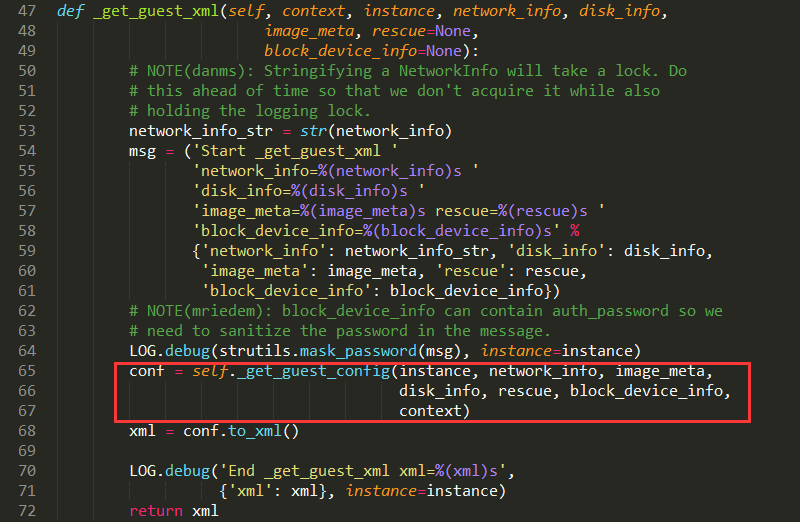
get_guest_config()
作用:
- 调用libvirt驱动层函数生成一个guest变量,或者说是对象。
- 向guest对象中填充各种信息
- 调用driver.get_config()函数生成tap设备
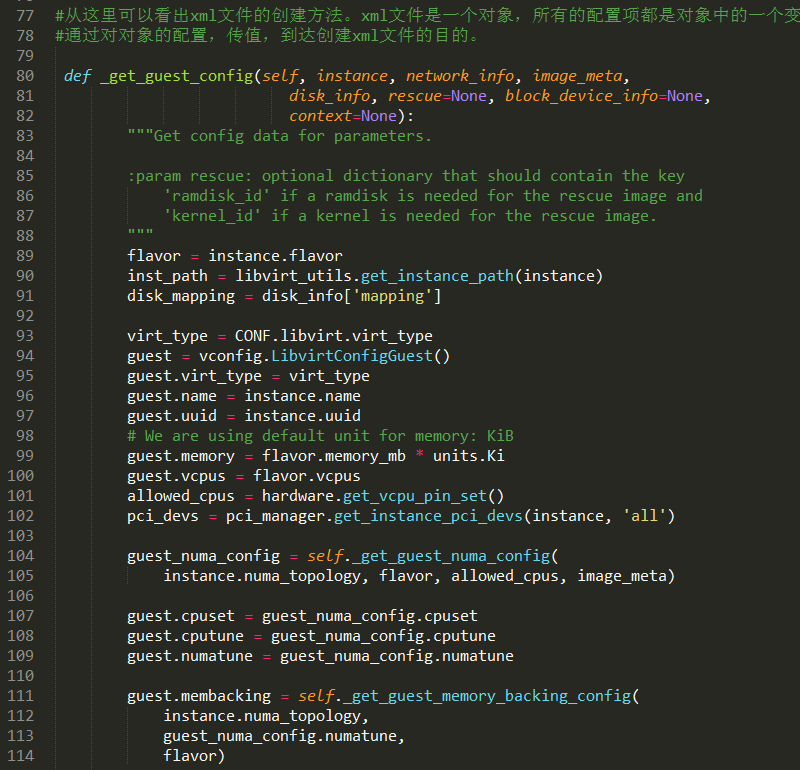
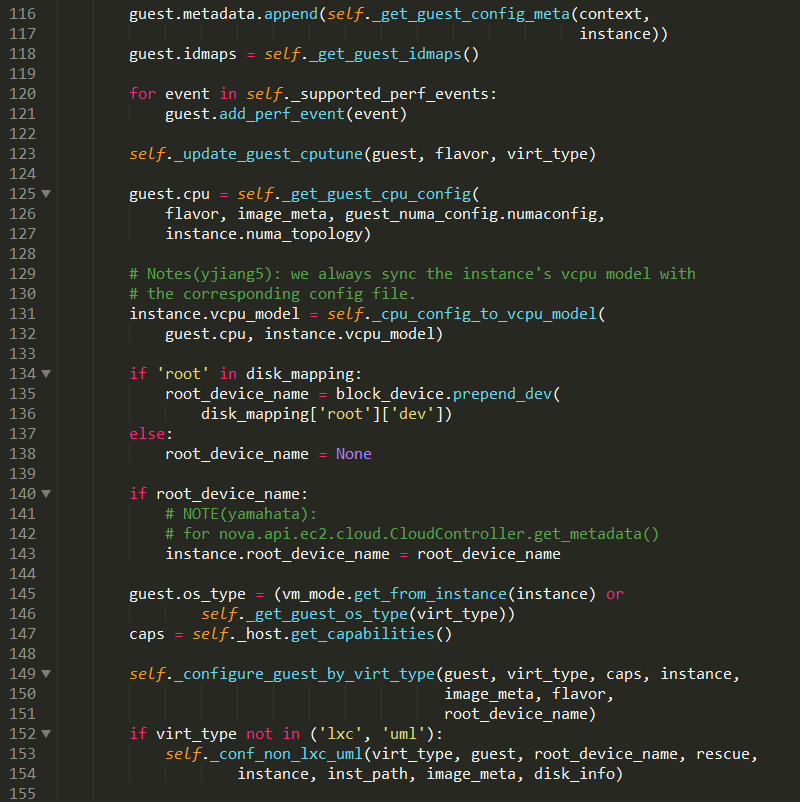
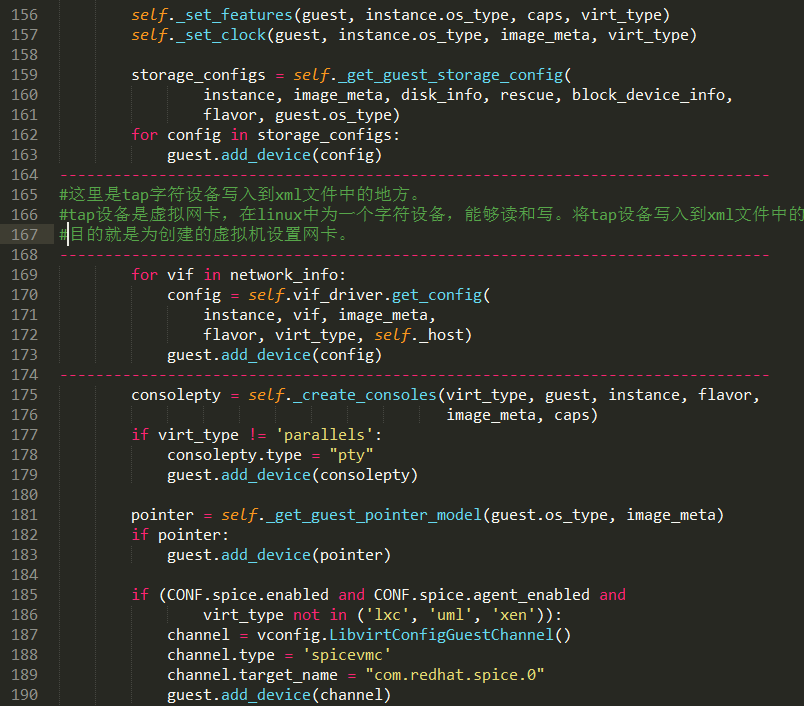
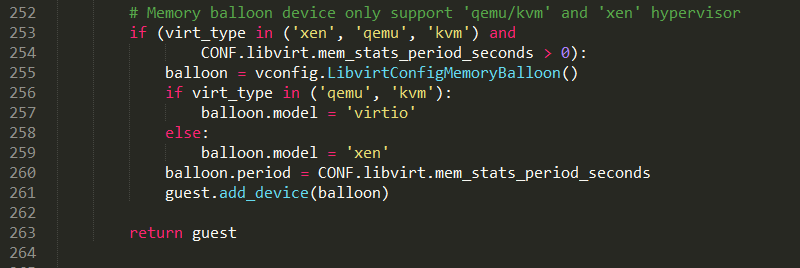
get_config()
作用:
生成tap设备。
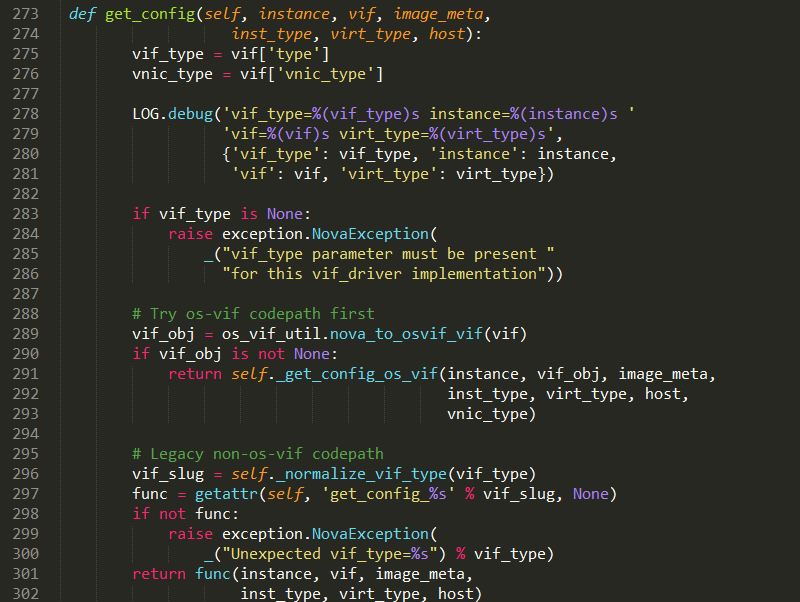
tap设备解释(经典):
tap是linux虚拟出来的设备,表现为一个字符设备,用户可以通过对该设备读写,实现数据交互。
tun/tap 驱动程序实现了虚拟网卡的功能,tun表示虚拟的是点对点设备,tap表示虚拟的是以太网设备,这两种设备针对网络包实施不同的封装。
利用tun/tap 驱动,可以将tcp/ip协议栈处理好的网络分包传给任何一个使用tun/tap驱动的进程,由进程重新处理后再发到物理链路中。做为虚拟
网卡驱动,Tun/Tap驱动程序的数据接收和发送并不直接和真实网卡打交道,他在Linux内核中添加了一个TUN/TAP虚拟网络设备的驱动程序和
一个与之相关连的字符设备 /dev/net/tun,字符设备tun作为用户空间和内核空间交换数据的接口。当内核将数据包发送到虚拟网络设备时,数据
包被保存在设备相关的一个队列中,直到用户空间程序通过打开的字符设备tun的描述符读取时,它才会被拷贝到用户空间的缓冲区中,其效果
就相当于,数据包直接发送到了用户空间。通过系统调用write发送数据包时其原理与此类似。
在linux下,要实现内核空间和用户空间数据的交互,有多种方式:
1 可以通用socket创建特殊套接字,利用套接字实现数据交互;
2 通过proc文件系统创建文件来进行数据交互;
3 还可以使用设备文件的方式。访问设备文件会调用设备驱动相应的例程,设备驱动本身就是内核空间和用户空间的一个接口,
Tun/tap驱动就是利用设备文件实现用户空间和内核空间的数据交互。
get_config_bridge()
作用:
生成网桥设备
